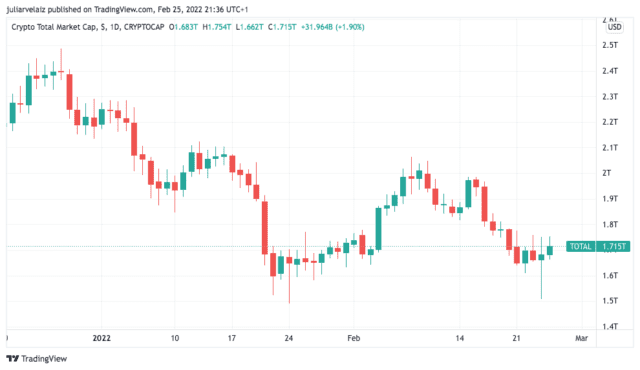The European Central Bank president Christine Lagarde called for quick approval of crypto regulations as war and crypto become intertwined and moral quandaries appear. Authorities fear Russia could use digital assets to bypass the sanctions imposed upon them.
Europe depends on Russia for 40% of its natural gas supplies and this has put expected Swift sanctions on standby. Governments and entities looking to pressure Russia will cling to whatever other prohibitions they can impose.
Many fear the currently proposed measures will not be enough as Putin’s strategy most likely had already foreseen this panorama. If authorities see crypto as a tool for Russian efforts to succeed, the introduction of regulatory frameworks might happen faster.
Related Reading | Russian Finance Minister Supporting Crypto Regulations Rather Than Complete Ban
Are Sanctions Enough?
Sanctions over Russian have been imposed by the United States, the European Union, the United Kingdom, Japan, Canada, Taiwan, and New Zealand. The country’s prohibitions mainly target military exports, banks, and oil refineries.
As the French Foreign Minister Jean-Yves Le Drian said, the aim is “asphyxiating Russia’s economy”, but are the current efforts enough?
“President Putin’s decision to escalate the military confrontation into a war suggests a willingness to accept near-term economic pain in favor of securing long-term geopolitical goals,” UBS Chief Investment Officer Mark Haefele said.
“… if banks are the eyes and ears of governments in this space, the explosion of digital currencies is blinding them,” wrote The New York Times.
Many experts worry that it is within Russia’s strategy to use cryptocurrencies to bypass the penalties. Blockchain technology is transparent, but crypto-powered marketplaces working from the dark web are being reported, as well as other money-laundering techniques.
Some experts believe Russia could be looking to become the world’s second-biggest mining hub. The country recently retreated from a proposed crypto ban and moved towards regulation with Putin specifically favoring the benefits of mining activity.
Related Reading |Japan Considers Easing The Country’s Strict $1 Trillion Coin Listing Regulations – Why Does It Matter?
Putin To Use Crypto
Experts believe Russian entities will use any means necessary to diminish the effects of the penalties, and digital assets, out of the reach of banks, could become one of their tools.
In an informal meeting of the Economic and Financial Affairs Council (ECOFIN) the European Central Bank president Christine Lagarde said the following:
“Whenever there is a ban, a prohibition, or a mechanism in place to boycott or prohibit, there are always criminal ways to try to circumvent a prohibition, which is why it’s so critically important that MiCA is pushed through as quickly as possible so we have a regulatory framework within which crypto assets can actually be caught in a regulatory framework”
She also claimed that there are ways to ensure criminal activity is properly dealt with.
Markets in Crypto-Assets (MiCA) is a proposed regulation in EU law the parliament has been working on since 2020, but the pace towards its implementation may not happen as quickly as Lagarde hopes for. It is yet to be formally introduced to lawmakers, approved by them, then reach a consensus amongst EU member states.
Moreover, the EU parliament has been urged to take the alleged environmental impact of blockchain technology into consideration. Many activists have intended to pressure towards a ban of crypto mining, but EU parliamentarian Stefan Berger stated he does not believe MiCA’s regulatory package is meant to settle technological or energy-related rules.
However, the question arises whether current geopolitical concerns might push to change this view. The consulting firm Elliptic alleged last year that Iran uses Bitcoin mining to circumvent trade embargoes and gain millions of dollars in revenue.
Will the aim to suffocate Russia extend to the crypto industry?
The times are full of uncertainty and it is fair to remember that nobody wins a war.
The crypto market is still young and these events could easily be turned into a narrative that favors the positions of banks so fiat money can prevail and step down on crypto. War quickly becomes more about money than it is about the people who suffer it. The strength of entities, governments, financial systems, and the digital era is now under test.


